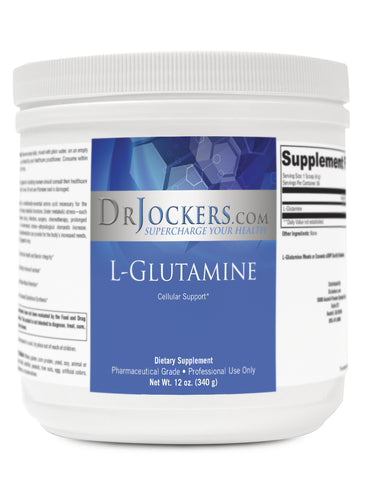
This is a supplement that I use personally on a near daily basis. I notice that it greatly helps me with bowel regularity and recovery from exercise. In addition, I feel less inflamed and have better mental clarity when using this regularly.- Dr. Jockers
Let's discuss the key benefits of L-Glutamine:
Why does Dr. Jockers recommend L-Glutamine?
Read our customer reviews and you'll see why our clients agree these are...
Supplements You Can
TRUST
L-Glutamine

What is Glutamine?
Glutamine is the most abundant free amino acid in the body and is an energy substrate for most cells—especially enterocytes (intestinal epithelial cells) and immune cells. It is also an essential component for numerous metabolic functions, including acid-base (pH) homeostasis; nitrogen supply; neurotransmitter production; and synthesis of glutathione, glucose, proteins, and nucleic acids.[1,2]
Glutamine is primarily synthesized and stored in skeletal muscle. It is considered a conditionally essential amino acid because, under normal circumstances, the body can manufacture enough to sustain physiological demands.
However, under metabolic stress—such as illness/disease, injury, infection, surgery, chemotherapy, prolonged exercise, or environmental stress—glutamine is released from body stores into the bloodstream and transported to tissues in deficit. Increased demands make exogenous glutamine sources (food, supplements) a necessity.[2]

How does Glutamine support the body during and recovery after a stress state?
During stress states, the body’s glutamine requirement exceeds supply, severely reducing both plasma and skeletal muscle pools of free glutamine.[1]
Without adequate glutamine to meet the needs of the intestine, immune system, and vital organs, a negative nitrogen balance and catabolism can result.[3] Nitrogen is necessary to repair wounds and keep the vital organs functioning; approximately one-third of this nitrogen comes from glutamine.
Adequate nutrition, which includes glutamine, can help spare host energy reserves and impede recovery complications.[4] In fact, it has been recommended that patients preparing for elective surgery ready themselves nutritionally, in part through glutamine supplementation, to optimize recovery.[5]
Research also suggests glutamine may help diminish risks associated with conventional therapeutics—such as high-dose chemotherapy and radiation—by supporting mucosal integrity, immune competence, and glutathione biosynthesis.[4,6,7]

How does this product support intestinal health and barrier function?
The greatest amount of glutamine is used by enterocytes. As their preferred fuel source, glutamine is necessary for their maintenance and healthy turnover. Supplementation may therefore enhance mucosal health.[1,8]
A healthy intestinal mucosa not only supports optimal nutrient absorption but also supports mucosal immune function and provides a barrier between bacteria and their products in the intestines and the bloodstream.[1,9,10]
Disruption of intestinal barrier function can lead to decreases in mucosal immune activity and increases in escaping toxins and bacteria, resulting in infections, illness, allergic reactions, skin conditions, and more. In various experimental models, glutamine administration has been shown to reduce epithelial cell death and preserve or improve barrier function.[11,12,13]
For instance, in an animal model of chemotherapy-induced intestinal damage, glutamine decreased the severity of intestinal injury perhaps through improved intestinal cell turnover and enhanced antioxidant activity.[14]

How does Glutamine create muscle tissue preservation?
Of the 20 amino acids required for protein synthesis, glutamine is the most abundant. It makes up 50% of all amino acids in the blood and 60% of those in the body. Not only is glutamine necessary to maintain positive nitrogen balance and protein synthesis, but also it has recently been shown to prevent muscle loss by influencing myostatin levels.[15]
Myostatin is a protein that inhibits muscle differentiation and growth. Its increased bioactivity has been observed in glucocorticoid-induced hypercatabolism and is associated with several pathologies characterized by marked skeletal muscle depletion.[15]
Glutamine is thought to have ergogenic effects through its influences on fluid and electrolyte uptake, glutamine pool repletion after intense training, stimulation of muscle glycogen synthesis, and the ability to increase growth hormone levels.[16, 17,18] While ergogenic effects are supported from a biochemical standpoint, more definitive studies are needed.
When does Dr. Jockers use L-Glutamine?
This is a supplement that I use personally on a near-daily basis. I notice that it greatly helps me with bowel regularity and recovery from exercise. In addition, I feel less inflamed and have better mental clarity when using this regularly.
What is the recommended dosage?
Normal Dosage: 1 scoop in a shake daily
Advanced Dosage: 2+ scoops in a shake daily
When introducing a new supplement, we recommend taking the lowest dose for 2-3 days. As tolerated, increase the dose until you have reached the recommended normal or advanced guidelines. Reduce to a tolerable dosage if adverse effects occur.
Select Your Options & Add to Cart
† These statements have not been evaluated by the Food and Drug Administration.
This product is not intended to diagnose, treat, cure or prevent any disease.







